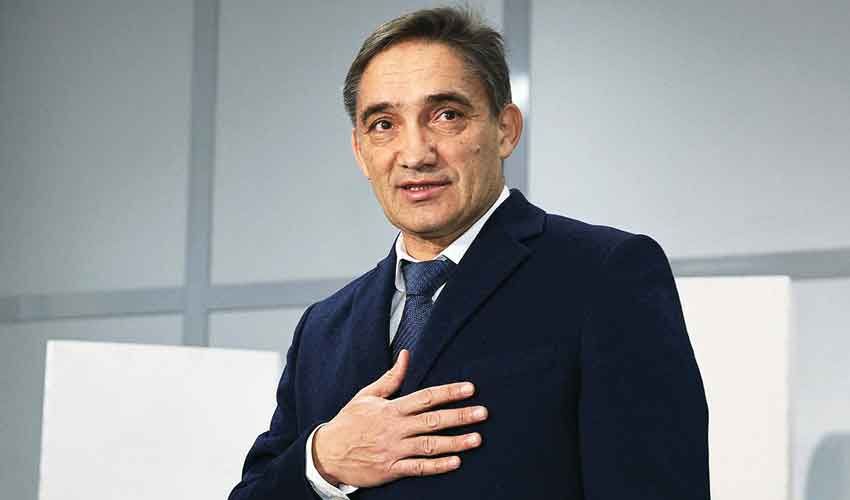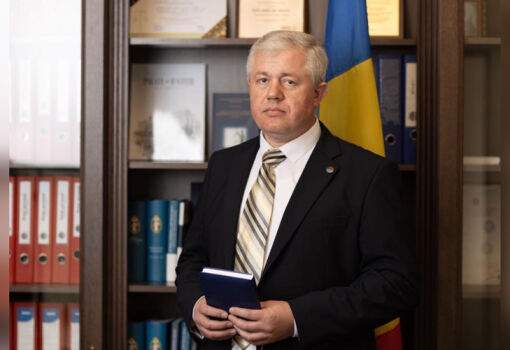
Prosecutor General Alexander Stoianoglo has become a symbol of solving personnel issues by "majority politics"
Almost every second deputy of the 11th convocation is by profession either an economist or a lawyer, or both. Almost a third are teachers or professors, including Speaker Ihor Grosu, who is a history teacher.
Alexandru Tănase, former president of the Constitutional Court, believes that it was “a difficult mandate for PAS, which took 63 parliamentary seats, none of them had experience, and they spent two years trying to understand how processes work.”
“I think it was the most unprofessional composition of a parliamentary group that had almost a constitutional majority. They spent about two years before they started to understand how processes work. The war in Ukraine, of course, also left its imprint on the parliamentary agenda. But the key element that can be highlighted and that characterizes the current parliament is intolerance towards minorities (opposition – ed.), intolerance towards critical opinions and a kind of majoritarian approach, where democracy is essentially replaced by majority rule,” Tanase said.
The existence of a parliamentary majority allowed the PAS faction to easily solve any personnel issue in the most important institutions of state power.
Among the most high-profile, far-reaching laws passed by the current parliament were the amendments to the Law on Prosecutor’s Office, introduced on August 24, 2021, which provided for the introduction of a mechanism for evaluating the Prosecutor General’s performance and his removal from office if the evaluation resulted in the qualification “unsatisfactory.” There were also options of “good” and “excellent”.
– Where is the “satisfactory” rating then? – Vasyl Bolya, then still a member of the BCS, asked.
– By definition, the performance of the Prosecutor General cannot be recognized as merely satisfactory. He must work either well, or excellent, or unsatisfactory. If you want to continue paying the salary of the Prosecutor General, whose performance is assessed as “satisfactory”, I wish you good luck,” parried Olesia Stamate, then vice-chair of the PAS party.
Later, it was on the basis of these amendments that the Supreme Council of Prosecutors would propose to remove Alexander Stojanoglo from the post of Prosecutor General, after a special commission assessed his performance as “unsatisfactory”.
In the story with the head of the Anti-Corruption Prosecutor’s Office Veronika Dragalin, as many commentators and politicians point out, there was an attempt to apply the draft law on merging this institution with the Prosecutor’s Office for Combating Organized Crime and Special Cases (PCCOCS) and creating the Prosecutor’s Office for Combating Corruption and Organized Crime (PACCO), in order to then initiate the procedure for selecting a new head. When it was passed, even the system froze and MPs had to vote manually. By chance. Dragalin resigned herself, and apparently there is no need for a new structure for the time being.
The decision of the PAS parliamentary majority of September 9, 2021, to recall the leadership of the National Commission of the Financial Market in its entirety (in corpore), headed by Valeriu Quizan, after hearing the report on the Commission’s activity for 2020, which was rated “unsatisfactory”, will also go down in history. It was embarrassing to watch the public lynching of the Board of Directors, the way its chairman – former Minister of Finance, former Chairman of the Association of Banks, top manager of the largest enterprises, with experience in the IMF and WB – like a schoolboy justifying himself, answering questions he was not used to answering – like why the NCFM Facebook page has so few likes.
Cornelia Cozlovski, who replaced him, also had a solid track record – a graduate of the Faculty of Applied Mathematics of Moldova State University, a master’s degree in economics and public administration, with work experience in banking and leasing, including executive positions – she headed the Raiffeisen-Leasing Moldova company, as well as in the civil service. But she worked for a little more than a year, resigning for “personal reasons”. She was replaced by Dumitru Budianschi, who, before becoming a deputy and finance minister, worked for ten years at the NGO Expert-Grup. Budiansky has been in charge of the commission until now. During this time NCFM lost the powers to supervise the non-banking financial system, insurance and reinsurance, which were transferred to the NBM. But it was vested with the authority to regulate and supervise consumer protection of all categories of financial services.
A brilliant example of PAS political equilibrium is the resignation of former NBM president Octavian Armashu and the appointment of Anca Dragu. Armashu was sent by Parliament to resign on December 21, 2023, with the wording for “insufficient and ineffective performance of the NBM in terms of auditing the processes and persons involved in the “billion theft” case”. 81 deputies voted in favor. On the next day, December 22, just before Christmas on New Style – the Christmas tree was already in the plenary session hall and carolers were waiting for their performance in the hall – Olesia Stamate, as the president of the legal commission, read from the central rostrum the draft parliamentary decision on the appointment of the new head of the NBM – Anca Dragu for a 7-year term. In other words, the Romanian citizen, who obtained the citizenship of our country “a few minutes” before the appointment – as it was written then, the “path” to the chair of the president of the National Bank of Moldova was paved, among other things, by the hands of the opposition.
Later, Vlad Batrincea would state that “the Bloc of Communists and Socialists does not regret the vote the day before on the resignation of citizen Armasu, because he took part in schemes that damaged the national budget of Moldova… But this does not excuse PAS in any way that they violated the law on the National Bank and brought a citizen from abroad to the leadership of the central bank of Moldova”.
Alexandru Mustiatica, who was appointed by the Parliament to the position of the Director of the Information and Security Service, is also a Romanian citizen. When presenting his candidacy, the chairperson of the legal commission could not name a law that would clearly state that the director of this particular institution, which is responsible for ensuring internal and external security of the state, can have dual citizenship. But when you have 63 mandates, does it matter? What matters is professionalism. And Mustiatica’s professional experience in the field of state security at the time of his appointment as the head of the ISS was “more than 10 years in the field of management and non-governmental field, and as for the field of security, the activity was based on research in this field”.
Since then, the service has matured. Parliament amended the Law on Information and Security Service, the Law on the Status of Information and Security Officer, and the Law on Counterintelligence and Foreign Intelligence Activities. In the debate on the relevant drafts, BCS MP Diana Karaman pointed to numerous negative opinions on these drafts:
“There is a de jure subcommittee in Parliament to control the activities of the SIB, in accordance with a law passed back in 1999, which is headed by a representative of the opposition. “Nominally they existed, but they never convened and never held discussions on how to go to the SIB and how to conduct monitoring activities. We will build this practice from scratch,” promised PAS MP Andrian Keptonar.
Now the services of the Parliament Secretariat are summarizing the results and preparing for publication the traditional report on the activities of the outgoing convocation. From it we will learn how many bills were initiated and passed, how many sessions were held, and how many times deputies violated the rules of procedure.
But the main thing will remain beyond the figures – how in four years the parliament, possessing almost unlimited power, reformatted all state institutions to suit itself. And if ever historians and analysts want to understand how the “majority policy” was formed in Moldova in the era of emergencies, instability and war in the neighboring countries, they should start with the way personnel issues were solved during these years.






